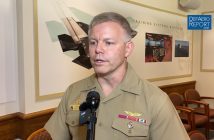Raimundas Karoblis, Lithuania’s defense minister, discusses NATO’s Trident Juncture 2018 exercise, Russia and more with Defense & Aerospace Report Editor Vago Muradian at the Reagan National Defense Forum at the Ronald Reagan Presidential Library in Simi Valley, Calif. Our coverage was sponsored by L3 Technologies and Leonardo DRS.
Raimundas Karoblis
Defense Minister, Lithuania
Reagan National Defense Forum
November 2018
Vago Muradian: Welcome to the Defense and Aerospace Report. I’m Vago Muradian here at the Reagan National Defense Forum at the Ronald Reagan Presidential Library in Simi Valley, California, where our coverage is sponsored by Leonardo DRS and L3 Technologies. And we have with us Lithuania’s Defense Minister Raimundas Karoblis. Sir, great seeing you again. We saw you in Halifax. You’re here at the Reagan Forum as well.
In that brief time, the Russians have seized Ukrainian vessels in the Sea of Azov. What does this incident tell you? What are some lessons you take? And how should the alliance be thinking and responding to this, given that it’s the latest provocation by the Russians in this crisis area?
Minister Raimundas Karoblis: It’s a continuation of Russia’s aggression in Ukraine. Let’s be about that. It’s not a single, local incident. It is possible to look through this point, so actually very technical. But from the political side, it’s clear that it is an act of aggression.
The first time Russia is, on Russia’s behalf. All acts before that were so they used, so the aspects of let’s say green men or actually the [Cardo] separatists. First time was on Russian behalf.
Secondly, of course, it’s an attempt to enforce the Crimea annexation. So relating, of course, the main principle of course in the course of annexation, it’s territorial sovereignty, territorial issues and also violating the Principles of the Sea Law about the openness of the sea; about the openness of navigation. But also the bilateral treaty which is formally valid between Russia and Ukraine about navigation in the Kerch Strait.
So this is the set. Well, we definitely should not look to this as a technical and a local incident, and really some adequate consequences should be because of Russia’s behavior.
Mr. Muradian: Russia, I’m going to ask you about the Trident Junction Exercise, but during the Trident Juncture Exercises there were reports that the Russian, for example, were jamming GPS signals over the Baltic. Can you talk to us a little bit about that and the potential danger associated with actions like that by the Russians?
Minister Karoblis: Yes. It’s a reflection that Russia wants more using the means of electronic warfare. And yes, they were incidents of course of jamming GPS, but I think it’s actually one of the episodes, I would say.
But generally speaking, so while also we discussed this issue with [our]diplomat, so probably Russia was, well, relatively calm during Trident Juncture Exercises. So compared with the [Inaudible] exercises which we have, so not overacting. We did not see too much increase of the activity on cyber, on the information propaganda aspects. Also, it was quite, let’s say normal, no big something escalation. While, of course, Russia reserved some areas of the Nordic Sea for the exercises, but it was used totally in the one area. So probably not too intensive GSP, but there was GPS was one of the episodes.
But really, of course, it was the question why Russia was quite calm? What will follow after this post and after this force? We see, of course, again continuation for the escalation and aggressive behavior against Ukraine.
Mr. Muradian: Let me ask you about Trident Juncture. It was obviously an Article 5 demonstration. All 29 NATO nations, but also Sweden and Finland which are EU nations participated in it as well. Talk to us a little bit about some of the lessons learned. Because Lithuanian forces also were a key part of the exercise, given that it was something that was in your neighborhood.
Minister Karoblis: Well, you would not like to speak more about lessons learned, I think, but just about the main elements which we have and about the role of Trident Juncture.
First of all, it’s the biggest NATO and partner exercise since the Cold War, which is really important from the deterrence point of view. It’s not about, it’s one aspect number, but the other aspect is the mobility which is also very, very important. And that mobility works so the enrollment, of course, the traditional issues of the durability and testing of the command and control aspects. And my understanding is that it really was quite good performance. So the enrollment of all the names, of the allies and armed forces starting from land forces, which is important. Then the sea and then the aircraft.
One of the seriousness of [inaudible]within the united [CE] states was the deployment of President Truman aircraft carrier, which was, of course, a very, very important asset. So also the importance of the exercise from the United States was also the deployment of the aircraft President Truman with all the assets.
And in general, it’s well demonstrated that while NATO is adjusting to the new security situation, they are back to conventional methods in Europe, with certain new elements which is mobility. And of course that we should continue these exercises in the area, be it in the North like with Norway or our region.
Also this year we had the quite big Anaconda Exercise first of all in Poland which also continued with Baltic countries [inaudible]in the autumn. And of course, we are looking for the exercises in 2019 and the biggest exercises in 2020 of the region.
Mr. Muradian: One last, briefly. Did you see anything in Trident Juncture that changes your strategic modernization program at all?
Minister Karoblis: Not at all. Well, we continue with our plans. But Trident Juncture Exercises are exercises with Lithuania that really we are on the right track by this modernization, that really the principles which will have this increase of maneuverability, increase of fire capabilities, and increase of intelligence, surveillance, and reconnaissance. They are right. We really need to continue with these conventional elements and while we continue to have the support from the society, we continue to have support from the politicians.
First year we are reaching for first time two percent from the GDP. And also this year what was important, that agreement of political parties represented by the Parliament to continue with the modernization, continue with increase of capabilities, and even further, increase of advancement after two percent, 2.5 percent until 2030. So we’ll be in the same situation as Poland and be among the leaders of demands in the finance [inaudible]in Europe.
Mr. Muradian: Defense Minister Raimundas Karoblis of Lithuania. Sir, it’s always a pleasure. Thanks very much. And next time I’ll talk to you about NBA Basketball.
Minister Karoblis: Okay. I also prepare myself more about the —
30




